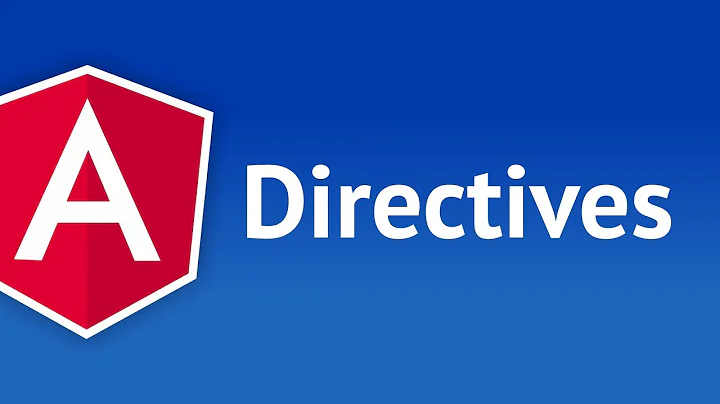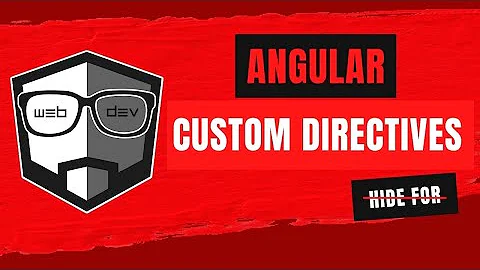Adding Multiple 'require' Options for Angular Directive
13,702
app.directive('myDirective', function() {
return {
restrict: "A",
require:['^parentDirective', '^ngModel'],
link: function ($scope, $element, $attrs, controllersArr) {
// parentDirective controller
controllersArr[0].someMethodCall();
// ngModel controller
controllersArr[1].$setViewValue();
}
}
});
Related videos on Youtube
Author by
Neel
Previously know as @blackops_programmer. I know, it was a pretty lame Display name.
Updated on June 20, 2022Comments
-
Neel about 2 years
Usually in Directives, I use
require: 'ngModel'if I want to pass the scope to it. This works fine. But I am now creating a directive that creates 5 different HTML elements each with different ngModels that is passed from parent. The ngmodels that needs to be passed as attribute arengModel1, ngModel2, ngModel3, ngModel4, ngModel5. How do I add multiple options in therequirecondition inside the directive?I tried these and it doesnt work:
require: ['ngModel1', 'ngModel2', 'ngModel3', 'ngModel4', 'ngModel5'],and
require: {'ngModel1', 'ngModel2', 'ngModel3', 'ngModel4', 'ngModel5'},and
require: 'ngModel1', 'ngModel2', 'ngModel3', 'ngModel4', 'ngModel5',and
require: 'ngModel1, ngModel2, ngModel3, ngModel4, ngModel5'},How do I add multiple require options?
EDIT:
HTML code:
<div get-vehicles-checkbox cars-ng-model="formData.cars" bikes-ng-model="formData.bikes" trucks-ng-model="formData.trucks" van-ng-model="formData.van" bus-ng-model="formData.bus" ></div>Directive:
app.directive('getVehiclesCheckbox', function($compile) { return { restrict: 'A', replace:true, // require: ? scope: { carsNgModel: '=', bikesNgModel: '=', trucksNgModel: '=', vanNgModel: '=', busNgModel: '=' }, controller: 'SomeController', link: function(scope, element, attrs, carsNgModel, bikesNgModel, trucksNgModel, vanNgModel, busNgModel) { scope.carsNgModel = {}, scope.bikesNgModel = {}, scope.trucksNgModel = {}, scope.vanNgModel = {}, scope.busNgModel = {} var html = '<span ng-repeat="car in cars">' + '<input type="checkbox" ng-model="carsNgModel[car.code]"> {{ car.number }} {{ car.description }}' + '</span>' + '<span ng-repeat="bike in bikes">' + '<input type="checkbox" ng-model="bikesNgModel[bike.code]"> {{ bike.number }} {{ bike.description }}' + '</span>'; //.... etc.. etc..... // COMPILE HTML //... .... ... } } });-
JoseM about 10 yearsThe docs say:
require: ['^parentDirectiveName', '?optionalDirectiveName', '?^optionalParent'] -
 Marc Kline about 10 yearsThe
Marc Kline about 10 yearsTherequireoption doesn't provide scope access; it provides access to other directives' controllers. Since you seem to have everything inside of one directive, it seems unnecessary here. -
user1005240 almost 10 yearsAlthough you misunderstood the reason for using the require feature, your question is still valid. I have the situation where i need access to multiple directive controller methods. I can access a method from a parent directive using the require like so: 'require:"^parentDirective"' but I also need to access a method within a seperate directive, the documentation says to use an array of strings like so: 'require:["^parentDirective","directiveTwo"]' but doing this causes errors although the both directives have been compiled to the DOM. Am I missing something here?
-
-
Void almost 8 yearsBy the way, adding a ? just after the ^ or ^^ will make the require "optional" and angular will not throw an error if it doesn't the required directive. All you need to do then is set an if() on the link's controller argument and you got an optional require.
-
The Red Pea about 7 yearsSo I concluded, like seen in comments on the OP, they didn't really need
require, is that true?











